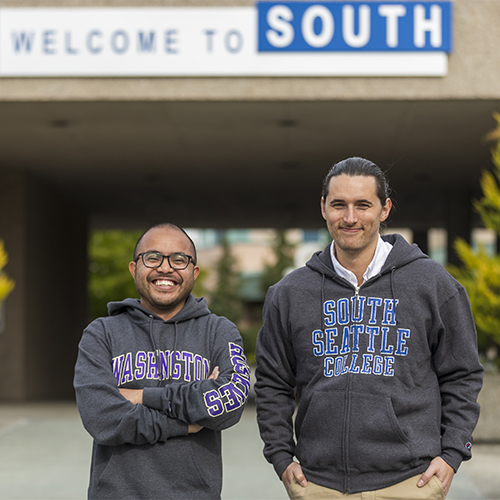STARTING YOUR UW JOURNEY
We recommend that prospective transfer students prioritise completing UW Gen Ed (General Education) and Areas of Inquiry course requirements before they transfer to the UW where possible.
Students in the College of Arts and Sciences must complete at least 90 credits outside of their major department, and most of our majors require between 50-75 credits to complete. The minimum number of quarter credits required to complete a Bachelor of Arts is 180. If you are hoping to declare a language major at the UW, it is a good idea to begin that language study before being admitted to the UW.
Some majors admit students in good academic standing at any time without prerequisites (open majors), while others have certain requirements or prerequisite classes that need to be met before admission can be approved (minimum requirements majors). A select number of majors require an additional application even if prerequisites are met, or they may have a limited capacity for applicants (capacity-constrained majors). Here is a list of all majors available at UW.

In the College of Arts and Sciences Humanities division, we have the following major types:
- Open majors: Classical Studies, Comparative History of Ideas, French, Finnish, Greek, Latin, Middle Eastern Languages and Cultures, Norwegian, Scandinavian Studies
- Minimum requirements: Chinese, Cinema and Media Studies, English (Language, Literature, and Culture), German Studies, Japanese, Korean, Linguistics, South Asian Languages, Spanish
- Capacity constrained: English (Creative Writing)
WORLD LANGUAGE MAJORS
Meet with a Humanities Academic Services (HAS) advisor to establish a timeline and a degree plan to complete a language major once you transfer to the University of Washington. We recommend that transfer students complete at least two years of language courses in the desired major prior to admission to UW. (However, this is not required, especially for languages like Korean that are seldom taught at smaller institutions.)
We are happy to meet with you before you are admitted to the UW to answer some of your academic planning questions. Some of our language majors are difficult (and not always possible) to complete in two years as a transfer student if you are beginning the language at the first year at the UW, so you will need to plan your degree timeline strategically even prior to entering the UW. While our language requirements can sometimes make transferring difficult, we have many transfer students who were very successful in these departments.
Planning Ahead
-
The UW has several resources available to help you understand how to transfer.
Your Washington State community college adviser is a powerful resource. If they know you are transferring to the UW, they can help you with your academic planning at your WA CC. An adviser at the UW Humanities Academic Services Center can also answer some of your questions.
-
Yes! Our advising team can answer your questions even if you're not a current UW student. Please make an appointment to talk with us about your transfer and academic planning questions.
-
Contrary to the popular narrative, Humanities majors are in high demand. You can find beginning information about careers for Humanities majors here.
The University of Washington Career & Internship Center has tremendous resources for career and internship searches, career fairs, workshops on creating strong cover letters, resumes, and LinkedIn pages.
Every Humanities Department website has information about careers and your advisers in the Humanities Academic Services Center are ready to talk with you about careers and internships.
Registration and Transfer Courses
-
During your first quarter at the UW, you will most likely need to be manually registered into courses that require pre-requisites. Unfortunately, the UW registration system won’t always automatically recognize your transfer credits as the pre-requisite courses, especially if you are coming from a school that uses the semester system. That said, our advisors do have access to your transcripts, and can verify your eligibility for the course you're looking to join. After you’ve completed a UW course in a given language series, you should be able to self-register for future quarters without adviser assistance.
-
Yes, courses that have equivalencies and are of the appropriate level will be applied to your major. You will need to work with an advisor on how these courses will be applied to the major - i.e. as elective courses, core courses, etc. In some cases, you will need to provide a syllabus for the course.
-
This will depend on the school and the subject. Please check with a Humanities Academic Services adviser. English (ENGL) courses are typically only accepted as transferrable credit if they come from institutions in anglophone countries, defined by the University of Washington as Australia, Canada, Ireland, New Zealand, the United Kingdom or the United States. For information on this restriction, please see the Office of Admissions page on meeting transfer CADRs for English coursework.
Major and Degree Programs
-
Bachelor in Arts degree is a total of 180 credits and, on a regular credit track, and can be completed in four years or 12 full-time academic quarters. Theoretically, if a student arrives at the UW with 90 credits, they would only need 90 credits (typically six full-time academic quarters) to complete the 180 minimum. This will be dependent on the major track.
-
You can find the information for how to declare each major in our division through our degree programs page here.
-
The application and eligibility information for applying to the Creative Writing option of the English major is here.
In the past 5 years, almost every qualified student was admitted to the Creative Writing option of the major, either in their first or second attempts to be admitted. You have two opportunities to apply.
-
There can be, for minimum requirements majors. You can find the information on pre-requisites needed for each minimum requirements major in our division through our degree programs page here.
-
That's not a problem! There are plenty of courses you can pursue at UW to complete your General Education requirements and Areas of Inquiry. This will allow you to focus on your major coursework upon arrival at the UW - everyone's pathway to a major can be different.
-
First, you will want to check our University of Washington Transfer Equivalency Guide - this will show you how your courses should be converting to UW if you're transferring from a 2-year colleges in Washington state. Most, if not all, of these courses, will count towards your General Education Requirements. If you are transferring to UW from a four-year institution, there may be some courses for which you need to provide syllabi in order for Humanities advisors to properly apply your transfer courses to your UW record.
-
First, we highly recommend checking out the department and major websites that will provide the requirements for the major and the application process for the major.
Second, during your first few quarters at the UW, you may need help manually enrolling in sequential courses or courses that require pre-requisites due to the UW system not recognizing your transfer credits. You do not need to retake these pre-requisites and after you are manually enrolled at the UW you will be able to self-enroll afterward.
Third, meet with an advisor regularly to ensure your transfer courses have been applied to your degree requirements accurately and that you are making satisfactory degree progress once admitted to the UW.
-
Several of the Humanities majors do have Honors options. You can find information about the eligibility requirements and academic plans for honors in each major by going to each Department's website. You will find a list of Humanities Departments and their majors here.
Double Majors and Minors
-
Yes, if you plan carefully with your advisers, it is possible to double major or add a minor to your major. For example, if you transfer 90 credits to the UW, and each of your two chosen majors requires 60 credits, you could graduate from the UW with 2 majors at 210 credits (the maximum number of credits allowed at the UW for a single degree). Most minors take between 25 and 30 credits to complete.
-
The University will initially apply only 90 credits to your UW record to allow you a full two years to study at the UW if you wish. However, if you have up to 135 transfer credits and want all of those to apply to your UW degree, you can ask to have them applied to your UW academic record. You must have at least 45 credits in residence at the UW and a minimum of 45 credits in residence from your final 60 for the UW to grant a degree. Some majors also have residency requirements, you can check that on department websites here.
-
If all of your credits from your previous academic institution are Running Start credits, you will have the option of completing 12 full-time academic quarters at the UW to complete your degree or a maximum of 210 credits. The beauty of your Running Start credits is that they allow you the flexibility to potentially graduate from the UW in 6 full-time academic quarters, but you can stay for the full 12 academic quarters if you choose. It’s always a great idea to stay in touch with your academic advisor when it comes to degree planning.
Student Success and Support Resources
-
The first source for funding at any academic institution is the Office of Student Financial Aid.
The UW also has a powerful resource for students searching for scholarships.
Many academic departments have funding for their majors. Check with your major department’s website under the “resources” tab to see what they have available for incoming students. You will find a list of Humanities Departments and their majors here.
And, if you are planning to study abroad while at the UW, the Study Abroad office has resources available as well.
-
First, we strongly encourage you to check the opportunities available for their students through each academic department. You will find a list of Humanities Departments and their majors at this here.
The University has a robust Registered Student Organization program.There are so many opportunities at the UW for students. Please talk with your adviser about your particular needs or desires i.e. volunteering, employment, cultural exploration, and more.
Connect with us
Have additional questions? We invite you to meet with a member of our team at Humanities Academic Services.
